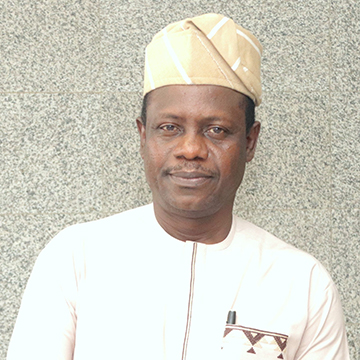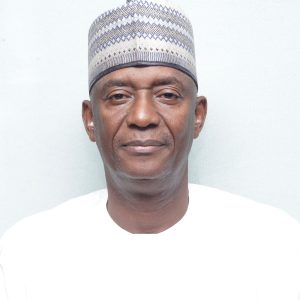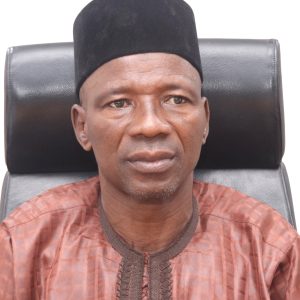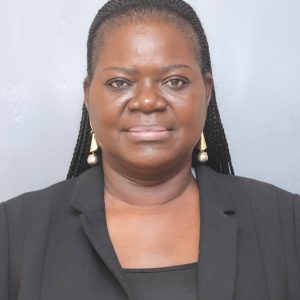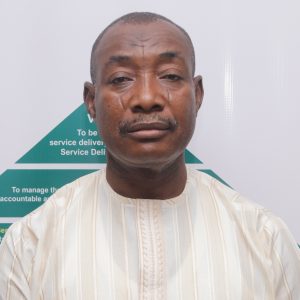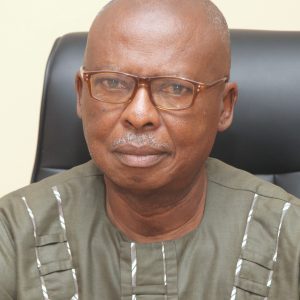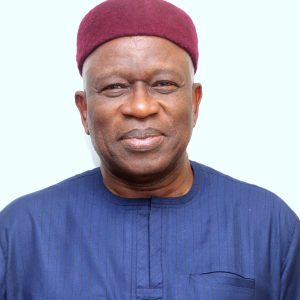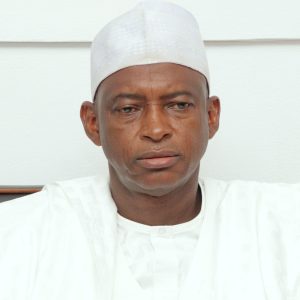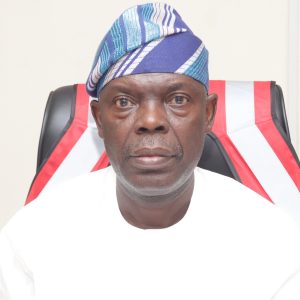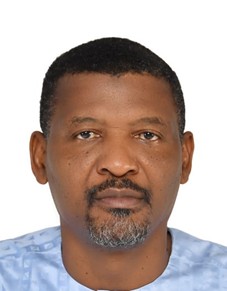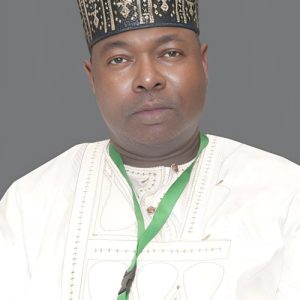Departments
FALUYI JOSEPH BABAFUNSHO
DIRECTOR
ICT DEPARTMENT ACTIVITIES
- Planning, organizing, coordinating, advising and supervising all ICT infrastructures and resources.
- Pursuing and promoting e-governance drive of government.
- Creating, managing and updating the ministry’s websites/portals, servers and email accounts.
- Ensuring an efficient system of development, deployment and administration of application software on LAN/WAN Networks of the Ministry in order to maintain their integrity.
- Ensuring that proper information system hardware protection and security mechanism are deployed in order to safeguard the integrity of ICT environment.
- Designing and supervising the deployment of regular ICT literacy/ proficiency programs of the staff in line with ICT policy of government.
- Advising on strict adherence to ICT standards, norms and practices in line with best practices.
- Liaising and collaborating with Nigerian Information Technology Development Agency (NITDA), computer professional Registration Council of Nigeria (CPN) and other MDAs as well as partner with local and foreign organization in order to share experiences and knowledge.
- Assisting relevant offices in the production of speeches and materials for workshops, seminars, press briefings, and conferences in the Ministry.
- Participating in both bilateral and multilateral matters relating to ICT.
- Performing any related duties that may be assigned from time to time.
Where reasonable grounds exist for suspecting that any person has conspired to commit or has committed an offence under the corrupt practice and other related offences Act 2000 or any other law prohibiting corruption, to receive and investigate any report of the conspiracy to commit, attempt to commit or commission of such offences and in the appropriate cases, the Anti-corruption and Transparency unit (ACTU) is the unit responsible for carrying out all necessary actions as indicated in the extant rule of the ministry.
Functions
The functions of the unit include the following:
- To examine the practices, systems and procedures of the ministry and where in the opinion of the ACTU such practices, systems or procedure aid or facilitate fraud or corruption, to direct and supervise a few of them.
- To advice, instruct and assist ministry personnel on ways they can eliminate fraud and corruption.
- To advice the ministry of any change in practice, system or procedures compatible with the effective discharge of duties of the ministry as the ACTU thinks fit to reduce the likelihood or incidence of bribery, corruption and related offences.
- To educate ministry personnel on and against bribery, corruption and related offences.
- To enlist and foster the support of the ministry personnel in combating corruption.
CHIROMA YAKUBU AHMED
Director
The Cash Management Department came into existence in October 2016 following the separation of the Budget Office of the Federation from the Ministry of Finance. It is one of the key departments of the Ministry. It is saddled with the responsibility of:
- Processing and issuance of Warrants and Authority to Incur Expenditures.
- Preparation of Disbursement Plans for Government Expenditure.
- Effective management of Service Wide Votes.
- Analysis of approved budget, periodic reporting and reconciliation on Warrants and AIEs issued to MDAs.
- Preparation of Cash Plan for Cash Management Committee Processing of contribution to Local and Foreign Organizations including counterpart funding.
- Proper record-keeping of all releases to MDAs Secretariat to Federal Cash Management Committee.
- To ensure resourceful and efficient management of Federal Government of Nigeria revenue and expenditure.
ABUBAKAR MUSA OTHMAN
Director Economic Research and Policy Management
To Reposition the Department through Capacity Building in an Efficient and Effective Manner to Achieve its Mandate on Research and Policy Management.
Economics Research and Policy Management Department is made up of four (4) divisions, which is headed by a Director.
- Macroeconomics Division
FUNCTIONS
- Undertake a Systematic Analysis of Macroeconomic Trends in Nigeria.
- Conduct Macroeconomic Research on Topical Issues.
- Using Econometric Model to Forecast Revenue.
- Using Econometric Model to Forecast Expenditure.
- Monitor and Track Macroeconomic Indicators of the Nigerian Economy.
- Monitor the Implementation of FEC Policy/Project Decisions that relates to the FMFBNP and its Parastatals/Agencies.
- Participate at other National and International fora on Economic Matters.
- Represent the Department at the FAAC Meetings/Activities.
- Monitor and Analyze Developments in relevant Regional/International Organizations e.g. ECOWAS, UNDP, OPEC.
- Represent the Ministry at Joint Economic Commission.
- Generate Data and Information required to evaluate and plan the activities of the Ministry.
- Interface with other Ministries, Extra-Ministerial Departments, and Agencies involved in economic research & development, and policy matters.
2. Policy Division
FUNCTIONS
- Provide inputs for economic policy initiatives.
- Review, Evaluate and Implement Government Economic Policies.
- Track Implementation of Economic Policy Initiatives of the Federal Government.
- Monitor and Evaluate Government approved Capital Projects.
- Serve as Secretariat to top management meetings of the Ministry and its Parastatals and Agencies.
- Undertake Research and Analysis of Government Economic Policies.
- Collaborate with other Ministries on Economic Policy Matters.
- Serve as Secretariat to Strategic Revenue Growth Initiative.
3. Statistics & Publication Division
FUNCTIONS
- Analyze and Track Development issues and investments in the Country.
- Produce publications like Annual Report of the Ministry.
- Produce Quarterly Performance Report of the Economy.
- Coordinate collation of scorecard template (KPIs) for Departments and Parastatals of the Ministry.
- In conjunction with a representative from ICT, represent the Ministry in open data policy Programme under the auspices of the Federal Ministry of Communication Technology.
- Organize the Ministry’s Sectoral Consultative Committee on Statistics.
- Represent the Ministry at the meeting of Government Finance Statistics organized by CBN.
4. Library Division
FUNCTIONS
- Process acquisition of library books and equipment.
- Process cataloguing and classification of books.
- Purchase of Newspapers, Journals and Magazines.
- Current Awareness Services (CAS).
- Selective Dissemination of Information (SDI).
Ajayi Olusesan Kolade
Director Finance and Accounts
The Finance and Accounts Department is statutorily empowered by the Constitution of the Federal Republic of Nigeria, 1999, and the Financial Regulations as revised up to 1st January 2000 to manage the finances of the Ministry and maintain accurate accounting records.
The Department is subdivided into two Divisions namely Finance & Accounts and Budget Division, with the following duties.
- Finance and Accounts Division:
- Management of Budget, Finance and Accounting activities of the Ministry.
- Receipt of revenue and payment for goods and services.
- Maintenance of proper accounting books and records.
- Operation of official Bank Accounts (i.e. Overhead and Capital Accounts).
- Preparation of daily/periodic Financial Reports to Management.
- Reconciliation of Bank accounts(where necessary).
- Co-ordination, supervision and responding to Federal Audit Queries.
- Reconciliation of Bank Statements with Records in the Ministry’s Overhead and Capital Accounts.
- Representation of the Ministry at the Public Accounts Committee (PAC) of the National Assembly.
- Representation of the Ministry on the National and International Financial Reporting Council.
2. Budgetary Division:
- Generalizing and initiating policies on budget matters.
- Supervising, coordinating and appraising budget proposals from all departments and parastatals.
- Budget monitoring of the ministry and parastatals’ projects all over the country.
- Advising on Budgetary matters.
- Selective Dissemination of Information (SDI).
EGUNDEBI OLUWAYEMISI MOJIRADE
Director General Services
The General Services Department is one of the departments created in 2013 to strengthen service delivery in the Federal Civil Service, through the enhancement of the capacities of all Departments in MDAs for the optimal realization of their corporate mandates:
- To generally give specialized technical/management support services to all Departments and Units towards ensuring the efficient discharge of their statutory responsibilities.
- To ensure optimal and capacity utilization of all facilities within the Ministry.
- Provide a conducive and secure working environment, and ensure value for money on all services rendered to the Ministry.
Highlights of the core mandate are as follows:
- Handling security Matters.
- General Stores Management.
- Clean Health and Management wastes.
- Office Allocation and Maintenance.
- Management of Plants and Equipment/Lifts, Utility Services i.e. Electricity, Water, Telephone, PABX; General Facility Management. Transport Administration.
- Any other business that may be assigned by the Permanent Secretary from time to time.
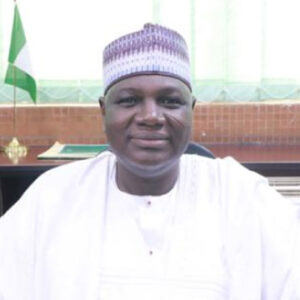
MOHAMMED ALI
Director Home Finance
The Home Finance Department handles matters relating to financial relations between the Federal, State and Local Governments. It is the Secretariat of the Federation Account Allocation Committee (FAAC) as provided in Section 5 of the Federation Account Act of 1982. It coordinates the activities relating to the supervisory role of the Ministry over Nigeria Customs Service as well as Government Parastatals and Agencies in the financial service sector. Also, it deals with matters on trade facilitation and issues of export and import guidelines/documentation requirements. The Department represents the Ministry on the Boards of Nigeria Customs Service, Nigeria Deposit Insurance Corporation, Securities and Exchange Commission, Nigeria Export-Import Bank, National Insurance Commission, Investments and Securities Tribunal and the Agricultural Credit Guarantee Scheme Fund.
The Home Finance Department is made up of three (3) Divisions namely;
- Trade Relations Division.
- Banking and other Financial Institutions Division.
- and States Finances and Public Investment Division.
- TRADE RELATIONS DIVISION
Trade Relation Division deals with all the policy issues relating to the Nigerian Exports Supervision Scheme (NESS) and Comprehensive lmport Supervision Scheme (CISS). The Division coordinates the activities relating to the supervisory role of the Ministry over the Nigeria Customs Service and also supervises, in collaboration with the Central Bank of Nigeria (CBN) the activities of Pre-shipment Inspection Agents (PIAs) and Monitoring & Evaluation Agents (MEAs) appointed by the FGN under the purview of the Ministry to provide surveillance services on the Nigerian Oil/Gas and Non-oil exports.
Key Projects/Initiatives
- Represents the Ministry on the Technical Committee on NESS and CISS.
- Processes the appointment of Pre-shipment Inspection Agents (PIAs) and Monitoring & Evaluation Agents (MEAs) in collaboration with the Ministry’s Procurement Department.
- Processes the appointment of banks for NESS Fee collection on Oil/Gas and Non-oil exports.
- Collaborates with CBN on verification exercises on the activities of dealer banks (collecting banks).
- Carries out quarterly verification exercises on the activities of PIAs for Oil and Non-oil exports.
- Conducts sensitization workshops on Nigerian Exports Supervision Scheme (NESS) for regulators, exporters, operators, and the general public in collaboration with the CBN.
- Processes payments of invoices submitted by the PIAs on both Oil/Gas and Non-oil based exports after verification by the CBN.
- The division in collaboration with the Ministry of Mines and Steel Development (MMSD) is in the process of finalizing the review of the Guidelines for Solid Mineral Exports.
- Regular review of Import/Export Guidelines to reflect best practices in the sector.
- Maintains records of Returns on Capital Importation,
- Verification of invoices/claims of services provided by the Scanning/ICT Service Providers for payment.
- Currently superintends the transfer of ICT services from Webb Fontaine to the Nigeria Customs Services.
- Respond to all issues relating to AfCFTA.
- BANKS AND OTHER FINANCIAL INSTITUTIONS DIVISION (BFI)
The Banks and other Financial Institutions (BFI) Division is charged with the responsibility of collaborating with the following agencies under the purview of the Ministry in the implementation of Government Policies to ensure financial stability.
- Nigerian Deposit Insurance Corporation (NDIC).
- Securities and Exchange Commission (SEC).
- Nigerian Export-Import Bank (NEXIM).
- National Insurance Commission (NAICOM).
- Assets Management Corporation of Nigeria (AMCON).
- Investment and Securities Tribunal (IST).
Nigeria Deposit Insurance Corporation (NDIC)
The Nigeria Deposit Insurance Corporation (NDIC) insures all deposit liabilities of licensed banks and other financial institutions and ensures depositors’ protection towards enhancing public confidence in the banking system through periodic examination of deposit money banks and primary mortgage institutions in collaboration with the Central Bank of Nigeria.
Securities and Exchange Commission (SEC)
The Securities and Exchange Commission (SEC) is the apex regulatory authority for the supervision and regulation of the Capital Market with the view to ensuring the protection of investors and the development of the capital market. It also registers and supervises the issuance of securities of public companies, mergers and acquisitions as well as regulates the activity of market operators.
Nigerian Export-Import Bank (NEXIM)
The Nigerian Export-Import Bank (NEXIM) was established to undertake the business of export credit guarantee and export credit insurance. It provides export/import financing and grants loans to the non-oil sector e.g., manufacturing, agriculture, solid minerals and services as well as export credit guarantee in local and foreign currencies and encourages exporters in export business.
National Insurance Commission (NAICOM)
NAICOM is the regulatory authority of the Insurance Industry. Its operations are geared towards effective regulation, protection of Insurance policy holders, the establishment of standards for the conduct of Insurance business and good corporate governance. It also facilitates financial inclusion and financial sector development to increase insurance penetration through the development of micro-insurance.
Investment and Securities Tribunal (IST)
The IST was established to adjudicate amicable settlement/resolution of disputes involving stakeholders in the Capital Market and ensure quick dispensation of judgments. The Ministry is being represented on the Tribunal to ensure that its adjudication is in line with government policy.
Financial System Strategy (FSS 2020)
The FSS 2020 is coordinated by a Steering Committee with its Project Management Office (PMO) domiciled at CBN and jointly chaired by the Honourable Minister of Finance and the CBN Governor. The FSS 2020 is the government’s framework for reforming the Nigerian financial services sector and facilitating its implementation.
- SFI Division
The State Finances and Public Investment Division (SFI) statutory responsibilities are as follows;
- Administration of Financial relations between the Federal, State and Local Governments.
- Processes State Governments’ requests for irrevocable Standing Payment Order (ISPO).
- Provides the Secretariat for the Federation Account Allocation Committee (FAAC) monthly meetings.
- Handles matters relating to public investment.
- Coordinates the hosting of the Annual Conference of the National Council of Finance and Economic Development (NACOFED).
- Coordinates the States’ Fiscal Transparency, Accountability and Sustainability Programme.
Agricultural Credit Guarantee Scheme Fund (ACGSF)
The Agricultural Credit Guarantee Scheme Fund was established by Decree No. 20 of 19977 to guarantee agricultural credit facilities granted to farmers. The Federal Government and the Central Bank of Nigeria both contribute to the Fund in the ratio of 60% and 40%, respectively. The CBN however doubles as the Managing Agent of the Scheme and the Secretariat of the ACGSF. The Director, Home Finance serves as the Chairman of the Board of ACGSF
List of key Programmes/ Initiatives;
- Coordinates financial relations amongst the Federal, State and Local Governments, Parastatals and Government-owned Companies.
- Liaises closely with Revenue Generating Agencies such as NNPC, FIRS, NCS, NUPRC & MMSD, etc. on financial matters on behalf of the Federal Government of Nigeria.
- Liaises with DMO over States’ debt matters.
- Serves as the Secretariat of the Federation Account Allocation Committee (FAAC).
- Organizes the Annual National Council on Finance and Economic Development (NACOFED).
- Handles matters relating to public investments such as the Sovereign Wealth Fund.
- Liaise with the OAGF on issues relating to the disbursement of funds to the three tiers of government.
- Collaborate with the OAGF on the management of Special Accounts of the Federal Government and the Federation.
Mrs. Aderonke, A. Jaiyesimi
Director Human Resource Management
Training Branch ensures the implementation of efficient and effective manpower development towards achieving the statutory mandate of the federal ministry of Finance. The activities of the Staff Welfare Unit areas are listed below:-
- Supervision of Staff Clinic for Federal Ministry of Finance.
- Procurement of drugs for the Clinic from time to time.
- Supervision and maintenance of Crèche which provides adequate care for Staff who are nursing mothers.
- Supervision and maintenance of the Gym to ensure that Staff is physically fit and healthy.
- Process the death benefit of the deceased officers who died in active service and ensure that the Next of Kin collects the benefits as at when due.
- Process retirement benefits of retired Officers to ensure that the document to the PFA and Pension Commission is submitted as at when due for processing of the benefits.
- Process Staff Identification Card for proper identification within and outside the premises.
- Initiate the procurement of Bags of Rice and oil for Staff during the festival period.
- Supervision and maintenance of Staff Canteen within the premises for optimal convenience and benefit of Staff.
MANGA MOHAMMED DANJUMA
Director Press
The Public and Media Relations Unit of the Federal Ministry of Finance is an extension of the Federal Ministry of Information and Communication established to provide effective Public Relations and Public Information management to the Ministry. Its functions are to:
- Formulate and articulate a dynamic strategy for achieving effective Media and Public Relations functions to the Ministry.
- Project the programs, policies, plans, and activities of the Ministry through Press Releases/ Statements, Press Conferences, Features Articles.
- Pamphlets, Brochures, Posters, Films/Photos, Journals, and Public Lectures.
- Provide adequate Press coverage of all activities of the Ministry and ensure prompt and detailed publicity of the Ministry’s policies and programs.
- Monitor all public opinion and reactions to the Ministry’s/ Extra Ministerial Departments’ plans, policies, projects, and achievements by reviewing and analyzing on a regular basis, all local and foreign media reports, both electronic and print which concern or affects the Ministry and its Extra Ministerial Departments and ensuring that clippings are cut and preserved as future reference materials.
- Inform, educate and enlighten all the different stakeholders on the activities, actions, policies, and programs of the Ministry.
- Issue rejoinders, where the need arises, on any adverse publication on the activities of the Ministry/Extra Ministerial Department and attend to press inquiries.
- Organize and provide press coverage of familiarization tours and facility visits; Carry out a post-campaign evaluation of the enlightenment programs.
- Place in the mass media all advertisements, jingles, and announcements for the Ministry/Extra Ministerial Department; Liaise with the Federal Ministry of Information and related Government Agencies.
- Liaise with the Ministry of Foreign Affairs in the processing of Note Verbale for officers of the Ministry who are on official assignment outside the country.
- Process Standard/Official Passport at the Nigerian Immigration Service Office.
- Provide Protocol formalities for the HMF, HMSF, Perm Sec, and DG Budget at the Airport and other engagement/functions.
- Provide protocol assistance to the immediate families of the HMF, HMSF, Perm Sec, and DG Budget as directed. Liaise with event organizers at functions involving the principal officers of the Ministry. Provide Hotel reservations for both local and foreign delegates on events hosted by the Ministry.
The Press Unit issues news releases on key economic issues as directed by the HMF and other activities of the HMF the Ministry. The Unit processes and places advertisements in the print and electronic media on important events organized by the Ministry. The unit handles Media relations, guest relations, publications, and manages publicity of the organization.
NWEKE GEORGE EJIOFOR.
DEPUTY DIRECTOR INTERNAL AUDIT
The Internal Audit Department of the Federal Ministry of Finance is responsible for the comprehensive and continuous audit of the Accounts, records and other resources of the Ministry, ensuring compliance with extant rules and regulations in their administration.
The Department is also responsible for the establishment and maintenance of an adequate and efficient internal control system covering the acquisition, custody and utilization of the Ministry’s resources.
George, N. Stanley
Director II International Economics Relations (IER)
The International Economic Relations Department is an arm of the Federal Ministry of Finance responsible for managing Nigeria’s economic relations with the global community. It maintains a vibrant, cordial and mutually beneficial bilateral relationship with other countries as well as strong relations with multilateral financial institutions.
Managing Nigeria’s external economic relations with multilateral financial institutions as well as donor agencies, the department is mandated to perform the following functions prominent among which are;
- International Monetary Fund (IMF).
- The World Bank Group (IFC, MIGA, IBRD, IDA, ICSD).
- Africa Development Bank Group (ADB, ADF & NTF).
- Islamic Development Bank.
- International Fund for Agricultural Development (IFAD).
- OPEC Fund for International Development.
- Africa Export-Import Bank (Afrexim bank).
- West African Monetary Institute.
- United Nations Economic Commission for Africa (UNECA).
- African Union and Africa 50 Fund.
- Japan International Cooperation Agency (JICA).
- French Development Bank (AFD).
- The Export-Import Bank of China.
- Economic Community of West African States (ECOWAS).
- West African Monetary Institute (WAMI) etc.
- Securing development assistance/concessional credits and grants on behalf of the Federal Government of Nigeria for intended beneficiaries.
- Coordinating policy issues on bilateral and multilateral economic relations with the global community.
- Preparation of the External Borrowing Plan of the Federal Government of Nigeria.
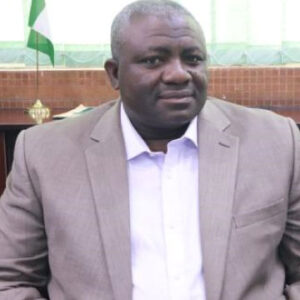
UMAR ABDULLAHI SHESHI
Director Legal
The Legal Services Unit occupies a strategic position in the Federal Ministry of Finance as it offers legal services to the office of the Honorable Minister, the Permanent Secretary, and all other departments of the Ministry. Its mandates include:
- Defending the Ministry in cases instituted against it by third parties in Courts all over the federation.
- Vetting of legal instruments intended between the Ministry and third parties and commenting on same for the purpose of ensuring perfection before execution by the Minister/Permanent Secretary.
- Preparation of Agreements on contracts awarded by the Ministry to third parties.
- Rendering of advice to the Minister/Permanent Secretary on Matters with legal implications.
- Participation in loan negotiation with Agencies; Participating with the Federal Inland Revenue Service in negotiation with other nations on matters relating to the avoidance of double taxation.
- Liaising with the office of the Attorney General of the Federation (AGF) in processing legal opinions giving effect to external loans.
- Liaising with the office of the AGF in processing instruments of ratification on Bilateral Agreements to which Nigeria has subscribed.
The Unit is made up of lawyers pooled from the office of the Attorney-General of the Federation and Minister of justice and headed by a director. The Unit also has other staff comprising Secretaries and Clerical officers who render support services to facilitate proper functioning of the unit.
MR. YUSUF ABDULLAHI MUSA
Director PICA
The primary focus of the Presidential Initiative on Continuous Audit (PICA) is to put systems and frameworks in place over finance and spending of government revenue. Since its inception, PICA has been funded by the Federal Government through the Service Wide Votes. Our goal is to maximize the utilization of resources through continuous assurance, so as to ensure that requirements for improved efficiency, effectiveness, and accountability are met.
The Department also administers the WHISTLEBLOWING UNIT: The main activities of the Unit are:
- Investigation of activities on the various tips submitted vide the Portal by the public.
- Organizing and attending town hall Meetings on whistle-blowing matters to sensitize the public on Whistle-blowing activities.
- Investigation of MDA’s found to be violating TSA and other forms of Federal Government of Nigeria (FGN) reforms on payroll management.
- Development of Whistleblowing and witness protection bills.
OLOYEDE M. AIYENIKO.
Director Procurement
The procurement department is one of the common services departments of the ministry. it reports directly to the Permanent Secretary. The department is charged with the responsibility of efficient procurement planning and processing in line with the provisions of the public procurement act of 2007 and extant rules.
The Procurement department performs the following functions:
- Efficient procurement planning based on needs and assessment.
- Secretariat of the ministerial tenders board (MTB).
- Advertisement, prequalification, bid solicitation, bid opening and bid evaluation.
- Act as secretariat of the ministry’s Procurement Planning Committee (PPC).
- Handling and processing of all capital and recurrent procurement goods, works, and services requiring due process certificate of ‘No Objection’ for awards.
- Liaison with BPP on all procurement issues on behalf of the ministry.
- Process approval of the Ministry’s contracts by the Federal Executive Council (FEC) where applicable following no objection from the bureau of public procurement.
- Provide oversight functions of the procurement activities of the ministry’s parastatals and procurement compliance monitoring on all contracts/projects approved by the MTB and FEC.
- Provide Headship and Secretariat to the ministry’s technical evaluation committee.
- Conduct price intelligence and market surveys.

ADEBAYO SEMIU OLAYIWOLA
Director Reform, Coordination, Service Improvement & Innovation
The Department of Reform Coordination and Service Improvement serves as the repository of Financial Reform initiatives/programmes in the Federal Civil Service. It maximizes the effectiveness and increases the efficiency of Information Communication Technology in Service Management process. With development of new Strategy of Performance and Institution of new control structure in the Public Service, it is the hub of service delivery. This is both a process and an outcome in an era of digital financial technology (fintech) development in emerging economy such as Nigeria.
DIVISION ACTIVITIES
REFORM COORDINATION (RC)
- Liaise with the Bureau of Public Service Reform (BPSR) on all reform related matters.
- Monitoring and Evaluation of all reform initiatives and activities in the Ministry.
- Coordinate implementation of all Public Sector reform initiatives/programmes in the Ministry.
- To periodically submit reports on reform activities of the Ministry and its Agencies to the Management, Bureau of Public Service Reform (BPSR) and Office of the Head of the Civil Service of the Federation (OHCSF).
- To submit quarterly reports on the reform activities of the Ministry to the management, Bureau of Public Service Reform (BPSR), Office of the Head of the Civil Service of the Federation (OHCSF) and Office of Secretary of Government of the Federation.
- Provide training, workshops and seminars on issues of Public Service reforms.
- Disseminate information within the Ministry on all aspect of Public Service reforms.
- Re-engineering business process and working procedure in the Ministry.
- Conduct research on all areas of public service reform.
- Handle change management for the Ministry e – government and modernization.
SERVICE IMPROVEMENT (SERVICOM)
- Spearhead the Ministry’s service delivery initiatives.
- Serve as a link between the Ministry and SERVICOM Office in the Presidency.
- Maintain professional network with critical Stakeholders and to coordinate SERVICOM matters of the Ministry such as customer relations/Grievances redress mechanism, Charter implementation and service improvement thereby ensuring SERVICOM Compliance.
- Vet charters of the Ministry before submitting to SERVICOM Office in the Presidency.
- Coordinate meetings of the stakeholder’s consultation forum on service delivery.
- Periodically submit reports on SERVICOM activities of the Ministry to the management.
- Submit quarterly report on SERVICOM activities of the Ministry to the management and SERVICOM Office in the Presidency.
SERVICE INNOVATION (SI)
- Initiate planning and implementation of all innovative initiatives/programmes aimed at building a strong culture of innovation in the public service.
- Identifying and reaching out to the development partners for necessary supports aimed at developing and implementing innovations programmes.
- Relates with the Management for the development and full implementation of identified innovative solutions.
- Head – Hunting for innovative top fliers for proper engagement in the service.
- Understanding sensitization campaigns necessary for assimilating innovation in the service.
- Tracking trendy competitions in innovation with a view in adopting same for implementation in the service.
- Documenting, monitoring and evaluating all identified innovative initiative ideas.
- Ensuring full usage and commercialization of all adopted innovative initiatives/programmes in the Ministry.
- Rendering periodic reports on innovative identified ideas to management.
INITIATIVES
- Championing transformation from Analogue to Digital financial technological transactions in the economic sector.
- Re-imagining the (financial) systems perspectives in innovation and financial technology intelligence in the economy.
- Investing in financial Research and Development to improve the Civil Service and the nation at large.
- Assessing, Appraising, Monitoring and Evaluation of penetration of financial technology in ease of doing business transactions in the three tiers of government.
- Collaboration with its Agencies to integrate culture of financial technology in the economy.
- To secure a safe and conducive work place for the security personnel the Department come up with reflective jackets for the guards. To ease the stress of visitors visiting the Ministry the front Desk Officer/Nodal Officers now wear a reflective jacket tagged “ASK SERVICOM”.
- The Department embarks on monthly sanitation of the work place to improve Healthy, Security, Safety Environment of the Ministry.
- The draft of the production of an integrated service charter for better understanding of the programmes and activities of the Agencies under the supervision of Federal Ministry of Finance for ease of doing businesses currently on-going.
- Production of quarterly and annual reports for easy assessment on performance of Reform/SERVICOM activities of the Ministry and Agencies for the year under review and submit same to Bureau of Public Service Reform (BPSR) and Office of the Head of the Civil Service of the Federation(OHCSF), and SERVICOM Office in the Presidency in line with National Strategy for Public Service Reform (NSPSR).
- The Department is proposing a specialised capacity building for staff of the Department on the monitoring, implementation and reporting of the present financial reform initiatives in the Ministry.
- The Department is Working with leadership of the Agencies under the Ministry to identify processes, systems and service gaps alongside Bureau of Public Service Reform (BPSR)and SERVICOM Office, the Presidency to develop interventions to eliminate such gaps.
- The Department unveiled the Information, Communication and Education Signage on COVID – 19 pandemic in the Ministry amongst others.
- Conduct price intelligence and market survey
BASHEER ABDULKADIR
DIRECTOR
The Technical Services Department (TSD) is a specialized Department within the Federal Ministry of Finance that provides technical, analytical, and policy support in critical revenue and investment-related areas of the economy. The Department supports evidence-based decision-making, policy formulation, and implementation in line with national fiscal and development priorities.
Core Functions and Mandates of TSD:
- Provision of technical expertise and policy analysis to support fiscal and economic decision-making
- Processing Import Duty Exemption Certificate (IDEC) and other fiscal incentives such as ETLS, CKD/SKD, Re-export, concessionary import under chapter 99 of the ECOWAS CET
- Chairs the Technical Review Board (TRB)
- Development and review of sector-specific financial and economic policies
- Advisory support on revenue optimization, investment structuring, and risk management
- Coordination with relevant Ministries, Departments, and Agencies (MDAs) and private sector stakeholders
- Monitoring and evaluation of policies and projects under its purview
- Support for negotiations, agreements, and compliance frameworks in key sectors
Divisions under the Technical Services Department
- Tax Policy Division
- Formulation and review of tax policies, laws, and regulations
- Annual fiscal policy measures and tariff amendments
- Analysis of the fiscal impact of tax reforms and incentives
- Serves as Secretariat to the Technical Review Board
- Processing Road Infrastructure Tax Credit Scheme
- Support for broadening the tax base and improving revenue mobilization
- Advisory role on tax treaties, exemptions, and fiscal harmonization
- Collaboration with revenue agencies on policy implementation
- Oil and Gas Division
- Development and analysis of fiscal policies for the oil and gas sector
- Evaluation of petroleum fiscal regimes, royalties, taxes, and production-sharing arrangements
- Advisory support on oil and gas agreements, licensing, and sector reforms
- Monitoring revenue performance and compliance in the oil and gas sector
- Liaison with sector regulators and operators on fiscal and financial matters
Ahmed Ghazalli
Director
http://youwinfmf.online/
YOUWIN stands for Youth Enterprise with Innovation in Nigeria. It is a government initiative designed to support young Nigerian entrepreneurs by providing grants, training, and mentorship. YOUWIN’s goal is to foster entrepreneurship, create job opportunities, and stimulate economic growth by helping young people start and expand their own businesses across various sectors. Through its programs, YOUWIN aims to reduce youth unemployment, drive innovation, and support sustainable economic development in Nigeria.
Key Functions and Impact Areas of YOUWIN
• Entrepreneurship Promotion: YOUWIN identifies, trains, and funds young Nigerian entrepreneurs, empowering them to start and scale businesses across various sectors. This creates jobs and fosters a culture of innovation and self-sufficiency among Nigerian youth.
• Youth Employment Generation: Through its funding programs and support, YOUWIN creates job opportunities by supporting startups and small businesses. These businesses employ young Nigerians, reducing unemployment and alleviating socioeconomic challenges.
• Business Development Services: YOUWIN provides business advisory services, mentorship, and capacity-building programs to help entrepreneurs navigate business challenges, improve management skills, and access market opportunities.
• Access to Finance and Grants: YOUWIN facilitates access to finance by offering grants and connecting young entrepreneurs with potential investors and funding opportunities to enable business growth and expansion.
• Economic Diversification Support: By promoting businesses in diverse sectors, YOUWIN contributes to Nigeria’s economic diversification agenda, reducing the country’s reliance on oil by encouraging growth in manufacturing, agriculture, technology, and services.
• Training and Capacity Building: YOUWIN offers targeted training on essential business skills, including financial management, marketing, and strategic planning, equipping young entrepreneurs with the knowledge needed to operate and sustain profitable ventures.
• Monitoring and Evaluation (M&E): YOUWIN maintains a strong M&E framework to track the progress and impact of funded businesses, ensuring accountability, continuous improvement, and alignment with national development goals.
• Strategic Partnerships: YOUWIN collaborates with government agencies, financial institutions, and the private sector to create a supportive ecosystem for youth entrepreneurship, leveraging partnerships to maximize its impact.
• Social Enterprise and Community Impact: Through its social enterprise approach, YOUWIN not only promotes individual success but also fosters positive community development, with YOUWIN-supported businesses contributing to local economies and social welfare.

